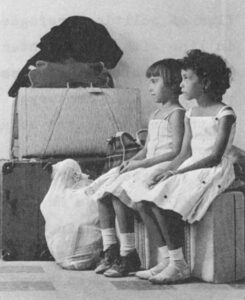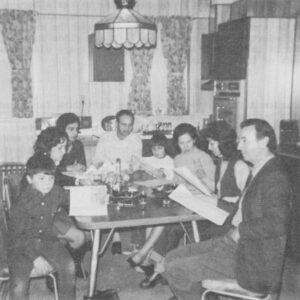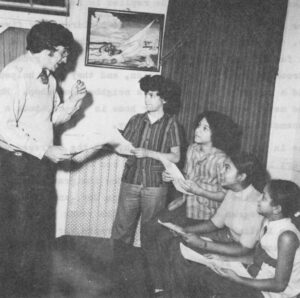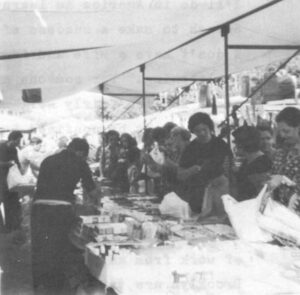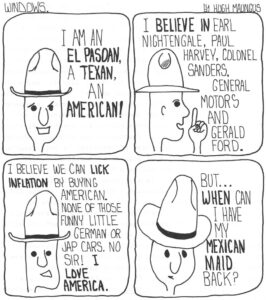SAN ANTONIO, Texas — St. Timothy’s is one of the many Roman Catholic churches serving the barrios of a city almost evenly divided between Anglos and residents of Mexican descent. Some of the parishioners are second-, third- and fourth-generation Mexican-American citizens, while others are more recent immigrants who have arrived in the United States by both legal and illegal routes. The church, unlike most institutional, is not interested in an immigrant’s documents.
When I arrived for an appointment at a nearby office that offers a variety of social services to neighborhood residents, my light blonde hair marked me as an Anglo stranger. A young woman standing at the building entrance quickly averted her head, gathered up a child in her arms and walked away. Who knew what I wanted? Could I be an unexpected and unwelcome visitor from the U.S. Immigration and Naturalization Service?
“It is a terribly sad thing to be considered an illegal person,” said Jesus Zapata, a community worker who noticed the woman’s reaction. “You are frightened to make a friend, because you don’t know who can be trusted. A fellow mejicano, not only an Anglo, might be an informer. To go anywhere for help is difficult, because any stranger could be a threat.”
Zapata is a man whose life illustrates the tenuous boundaries between “legal” and “illegal” immigration in an area of the United States with an intricate web of cultural and economic ties to another country. Like many other Mexican-Americans in the Southwest, Zapata worked in this country as an illegal alien for years before he was able to legalize his status. He was finally able to become a legal resident because he and his wife Maria had American-born children.
The distinction between a legal immigrant and an illegal alien — like the border between Texas and Mexico — is clear under American law, Those distinctions are not so clear for many Mexican-Americans who have relatives on the other side of the border, for those who — like Zapata — were once illegals themselves or for those who have close friends and relatives living in the United States without documents. The attitudes of Mexican-Americans toward illegal immigrants are extremely complex; they, range from complete sympathy for fellow mejicanos to fear that uncontrolled illegal immigration will threaten the shaky position of blue-collar workers who have struggled one rung up from poverty in the American economy. Many Mexican-Americans feel both the sympathy and the fear.
Jesus Zapata was the oldest of 13 children, born in a rural area far from the border between Texas and Mexico. When he was 18, his parents sent him to work as a baker in a small town near the Rio Bravo. He crossed the border illegally for the first time in 1948,
“I wanted to get married, but I didn’t have the money. When I came over the first time, my only intention was to make enough money to get married. I saved, and exchanged every dollar for 12.5 pesos. But the girl got tired of waiting in only two-and-a-half months, so I had no reason to stay there (in Mexico).
“After that, I worked at breaking in horses, shearing sheep, building a water tank — all of the jobs you do on a ranch. Then a man from San Antonio who owned a dairy farm came down and talked to the owner of the ranch where I was working. There were 13 of us illegals there — he picked me because I was the youngest, and I guess the strongest, I had to shave off my mustache and put on khaki pants so I would blend into the population better — so I wouldn’t look like a wetback who just came over from Mexico. The boss taught us how to say a few words of English like ‘how are you?’ and ‘I’m fine.’ I couldn’t speak any English at that time. We were stopped twice by the Immigration Service on the way north, but both times they let us go. The boss must have managed it.
“I worked for three years milking cows. They paid me $20 a week for a 17-hour day. Out of that money, I had to pay $7 a week for room and board. During that time, I would be loaned out to other ranchers at the will of my boss — l had a reputation as a good worker. I had no right to ask questions. Once when I was being taken away to another ranch in a truck, I opened my mouth and asked, ‘Where are we going, where are you taking me this time?’ They told me I had no right to ask any questions about anything because I was a wetback and lucky to have the chance to work in America at all.
“The most humiliating experience of my life as an illegal was when I was loaned out to work for nine days on a ranch owned by a terrible couple. Those people made me eat the leftovers from their dinner — even food that had already been chewed. The mattress they gave me to sleep on was filled with fleas and lice. I was scratching, scratching like a madman all night. So I preferred to sleep on the bare floor. You know, a boss will look at a person like I was and say, ‘See how he sleeps on the bare floor, he doesn’t care how he lives.’”
During his 11 years as an illegal, Zapata eluded Immigration Service officers four times. He was finally picked up while he was waiting at a crossroads for a man to contact him about a possible new job. Zapata noticed a man wandering around outside a nearby cafe and looking as though he were lost. “I asked him if he needed directions,” Zapata says with a laugh, “and then he identified himself as, an Immigration Service officer. Helpful Zapata. He asked for my papers and, of course, I had none. Two officers took me to my house, and they questioned my wife and me separately.
“They asked my wife many questions. Did I support my family? Was I a good husband, did I sleep at home every night? Did I ever disappear without the family knowing where I was? After the questions were over — after my wife said yes, I was a very good husband and supported my family, the officers told me they would take me away for two or three hours and tell me what documents I would need to become a legal resident. They were telling us the truth — that’s exactly what happened.”
Zapata was able to legalize his status because he had American-born children and parents of American citizens receive preference for entry into the United States. Illegal aliens who are able to legalize their residence in this country frequently manage to do so because their children were born here. However, the process was easier when Zapata became a legal resident in 1959 than it is for a Mexican illegal today. After he had obtained the necessary documents, Zapata made a brief visit to the Mexican border town of Matamoros to obtain his permit for legal entry into the United States. Then he re-entered the country at Brownsville, Texas.
Due to an administrative ruling by the Immigration Service, Mexicans who entered the country illegally after April 1973 must return to Mexico as soon as they apply for legalization of their residence in the United States. They must remain in Mexico during the entire period while they are awaiting their entry permits. For a man in Zapata’s former position — an illegal alien who is the father of American-born children — the average wait in Mexico is now 29 months. For a man trying to support his family, such a wait is all but impossible. The same administrative rule applies to all illegal immigrants from Western hemisphere nations, but illegal aliens from Europe and Asia may remain in the United States while they apply to legalize their status. Organizations concerned with the stability of immigrant families — notably the U.S. Catholic Conference — are pushing for an end to immigration policies that differentiate between different countries and areas of the world. Although the total number of legal Mexican immigrants has increased since the passage of a liberalized 1965 immigration law, the waiting lists keep lengthening because so many Mexicans have close relatives in the United States. And the prospect of a long wait in Mexico discourages many illegals who are eligible for preferential admission under American law.
“I didn’t have much trouble with my application because I had good recommendations here,” Zapata remembers. “My priest knew me very well — I had been active in the parish even though I was an illegal. But many, many illegals are known to no one outside their own families. When you are an illegal, you are a prisoner of anything that happens. You have no rights as a man. After I became legal, my whole life changed. The people who knew me before were very surprised at the change in met because I had a reputation as a quiet, docile person. I was afraid to speak up, to do anything but go between my home and my work. I changed because I now felt free to express my opinions, my concepts. I wanted very much to help poor people — it’s nearly impossible to help anyone when you are illegal yourself. After I became legal, I felt I had been reborn. Unless you have lived here illegally yourself, you don’t know how desperate you have to be to accept this.”
Although Zapata came from an extremely poor family, he was fortunate enough to have received five grades of schooling. “There was no such thing as a high school where we lived,” he says, “but at least I learned to read and write. Many of the Mexican people who come here are illiterate.” He points out that more than 95 per cent of Mexicans immigrating to the United States — both legally and illegally-come from the poorest sector of Mexican society. In their economic desperation, they resemble turn-of-the-century immigrants from Southern Europe. “We have dreams of improving ourselves in Mexico but we do not have the means,” Zapata says. “The wealth of the country does not reach working people. I see all of the things that are wrong with the system here, in America. But the immigrant does not think only of that — we also think of the terrible injustices in Mexico. We think of the injustice, the economic despair, that drove us out of our own country.”
After he became a legal resident, Zapata urged the other members of his family in Mexico against entering the United States illegally. “I had six children of my own and I couldn’t afford all of the expense involved in bringing in my brothers and sisters. Then my wife was sick and had to have four operations in five years. The main point is that I have only been working at a regular salary for seven years. Even after I became legal, I worked for many years at jobs below the minimum wage.”
Zapata is now a community worker in a small project funded by the U.S. Department of Health, Education and Welfare. Operating out of a small office near St. Timothy’s Church, the community workers provide services ranging from translations in dealing with government agencies to hot meals for schoolchildren. Half of the people who come to the office for help have family incomes of less than $1500 a year and less than two grades of education. In spite of their poverty, only 5 per cent of the people are on welfare. “The image of the immigrant as someone who wants welfare is completely wrong in my experience,” Zapata says. “The Mexican comes here in search of work, any work. Welfare is considered a shame. It makes me sad to know that some Anglos say the only reason a Mexican comes here is for welfare. It just isn’t true.”
Both Zapata and his wife are well known in the barrios of San Antonio. They are not the sort of “community spokesmen” who are quoted in the newspapers and on television programs but they are deeply involved in church and other neighborhood activities that affect ordinary people. Devout Catholics, they were the first Spanish-speaking presidents of the Christian Family Movement in San Antonio. “The disintegration of families is one of the things that concerns me most about the situation with illegal immigrants right now,” Zapata says. “The enforced separation of families is one of the human consequences that aren’t visible to people who don’t live and work in the barrios.”
Zapata has six children, ranging in age from 12 to 20. The oldest is married, working days and going to night school at San Antonio College, a local junior college. “The other kids want to go to college,” Zapata says, “and that’s a satisfaction to my wife and me. At home, we sit around our dinner table and have discussions about almost everything — economics, religion, social issues. Sometimes Spanish, sometimes in English. I just picked up my English — I never had the opportunity to go to night school because I was working so hard. My wife is the same. She has no formal education either, but we have both always had this desire to better ourselves, to do better for our own children. Very simply, that is why people leave their own country. Somehow, this simple human truth gets lost. Whether the person is ‘legal’ or “illegal’ in the eyes of the world — that person is a human being, trying to do better.”
Received in New York on March 10, 1975.
©1975 Susan Jacoby
Susan Jacoby, a freelance writer, is an Alicia Patterson fellow supported by the Rockefeller Foundation. This article may be published with credit to Ms. Jacoby, the Alicia Patterson Foundation and the Rockefeller Foundation.

